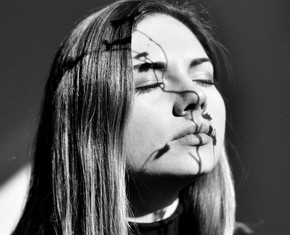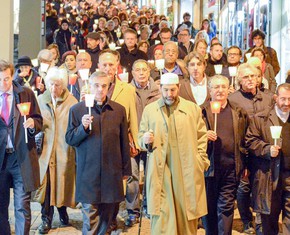The views expressed in our content reflect individual perspectives and do not represent the authoritative views of the Baha'i Faith.
I asked my mother, when I was nine years old, what she wanted me to be when I grew up. “I just want you to be happy,” she said.
She could’ve said “I want you to be a great physicist or the doctor who discovers the cure for cancer or the president,” but she didn’t. Instead, she set a higher bar, a much tougher goal: to be happy.
Every human being wants to be happy, but few of us get there. Think about it for a moment—are you happy? When you seek happiness, this is Baha’u’llah’s advice:
O Son of Spirit! My first counsel is this: Possess a pure, kindly and radiant heart, that thine may be a sovereignty ancient, imperishable and everlasting. – The Hidden Words, p. 3.
So in my adulthood, I set out on a quest to be a happier person. I tried hard to work on that “radiant” part, because that seemed to be the key.
The people I met who were radiantly joyful–well, I wanted some of that. It was obvious to me that their radiance came from a real inner joy, which in turn comes from transcending life’s inevitable tragedies and struggles. Radiance, I realized—the beautiful quality that shines out of a pure, kindly heart—occurs most often in children, whose innocent purity and happiness inspires just about everyone. Behavioral scientists tell us that children laugh hundreds of times every day, and that adults laugh an average of 17 times a day. Maybe that’s what Christ meant, I thought, when he said “Become as little children.”
In the Baha’i teachings, writings and prayers, one of the prevailing themes involves recognizing the qualities, or names, of the Supreme Being. Those divine names—the Generous, the Bountiful, the Helper, the Loving, the Kind—all give the Baha’is a sense of the attributes of God, the qualities we can each individually strive to develop in our own spiritual character.
So one of the things that helped me in my happiness quest was discovering a short tablet from Baha’u’llah that begins “In the Name of God, the Humorist.” I was fascinated and intrigued, so I did some research. In the original Arabic, Baha’u’llah used the word “mazzah,” provisionally translated as “the humorist.” However, “mazzah” has multiple shades of meaning, not necessarily referring to a jokester, a comedian or a frivolous person. Instead, it refers to a humorist in the highest and noblest sense of the term, someone who spreads joy and humors others in a playful, kind and loving way. That title gave me an entirely new perspective on how I could think about the Creator–and how I might possibly try to emulate that quality.
Then I began to notice that lots of Baha’is around the world had already developed it. Many people have remarked on this, but for some reason, maybe Baha’u’llah’s and Abdu’l-Baha’s examples, or their steadfast encouragement to be happy and joyful, Baha’is everywhere seem to gravitate toward the great, gracious gift of making people smile. Go to a Baha’i meeting and you’ll likely see what I mean.
So what is it that makes the Baha’i Faith such a happy religion? It probably came directly from Abdu’l-Baha:
… the foundation of Baha’u’llah is love. … you must have infinite love for each other, each preferring the other before himself. The people must be so attracted to you that they will exclaim, “What happiness exists among you!” and will see in your faces the lights of the Kingdom; then in wonderment they will turn to you and seek the cause of your happiness. You must give the message through action and deed, not alone by word. Word must be conjoined with deed. You must love your friend better than yourself; yes, be willing to sacrifice yourself. May everyone point to you and ask, “Why are these people so happy?” I want you to be happy… to laugh, smile and rejoice in order that others may be made happy by you. – Abdu’l-Baha, The Promulgation of Universal Peace, p. 218.
Personally, I’m still trying for as much happiness as possible, but I’ve learned that Baha’is are genuinely happy for lots of reasons.
Baha’is celebrate the arrival and the beautiful message of a new prophet of God, Baha’u’llah, and that in itself generates immense joy and happiness. We all participate in a diverse global Baha’i community with literally every nationality, racial group, culture, class and age; which lowers the barriers between people everywhere, emphasizes oneness and makes Baha’i community activities fun and interesting. Baha’i festivals, holy days and celebrations are meant for hospitality and humor. Baha’i communities gather every nineteen days for a Feast, which has both spiritual and social purposes.
I once asked a friend who had gone to her first Baha’i fireside—an informal meeting about the Baha’i teachings for spiritual seekers—what it was like. “Miles of smiles,” she said with a grin.
Also, I’ve found that Baha’is are generally interesting, thoughtful, fun-loving people—not dour, literal or fundamentalist. That’s probably true because the Baha’i teachings emphasize service to others, progressive revelation and unity. Ultimately, the Baha’i principles point the way toward a plan for a new unified world free of war, racism and conflict–which makes Baha’is optimistic, enthusiastic and hopeful about the future of the human race. Laughter, after all, means hope.
Want to be happy? Me too—that’s why I’m a Baha’i.
















Comments
Sign in or create an account
Continue with Googleor